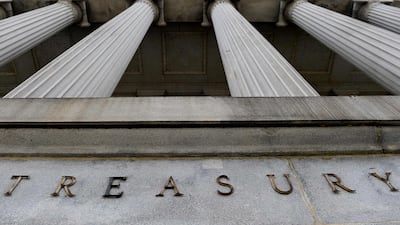The US Department of the Treasury’s Office of Foreign Assets Control on Tuesday designated two Syrian money service businesses accused of having “secretly helped” President Bashar Al Assad's regime and its allies.
The companies allowed the Syrian government and its allies to “maintain access to the international financial system in violation of international sanctions”, the Treasury added.
Damascus-based Al Fadel Exchange and the three brothers who own and operate it, as well as Al Adham Exchange Company are named in the new sanctions.
“Bashar Al Assad’s regime continues to rely on witting partners and deception to violate US, UK and EU sanctions, while ignoring the needs of the Syrian people,” Brian Nelson, US undersecretary for terrorism and financial intelligence, said in a statement.
The Department of State said in a statement that the actions "further demonstrate that the United States’ commitment to promoting accountability for the Assad regime’s abuses and justice for victims is unwavering".
Secretary of State Antony Blinken said the administration "urges states in the region to consider carefully the atrocities committed by the regime on the Syrian people, some of which rise to the level of war crimes and crimes against humanity".
President Joe Biden's administration has opposed normalising relations with the Assad regime, though it has urged its Arab partners to demand progress on humanitarian and narcotics-related fronts as they engage more with Damascus, including through Syria's reinstatement to the Arab League.
The fresh sanctions expand on the 2019 Caesar Syrian Civilian Protection Act, which placed a tough round of sanctions on the Assad regime.
The department accused Al Fadel Exchange of facilitating the transfer of “millions of dollars” into accounts at the Central Bank of Syria, which is sanctioned by Washington, “that benefit the Syrian government and President Bashar Al Assad”.
Washington also claims that Hezbollah, a key ally of the Syrian regime and Iran’s Islamic Revolutionary Guards Corps' Quds Force, has used Al Fadel Exchange to transfer money from other countries in the region to Syria.
The US similarly designated Al Adham over “millions” of dollars in transfers made to the Central Bank of Syria, accusing the company of “having materially assisted, sponsored or provided financial, material or technological support for, or goods or services in support of, the government of Syria”.
“The United States will continue to push for reforms that will improve the conditions of people living under Assad and to hold accountable those who enable the regime’s continued repression of its people,” Mr Nelson said.
Al Fadel Exchange did not immediately respond to The National's request for comment.
Caroline Rose, a director at the Washington-based New Lines Institute who focuses on Syria, said the fresh sanctions show that "the US is continually seeking to update their sanctions designations list ... particularly as Washington seeks to impose warnings against countries pursuing normalisation with Syria".
"For the US, this is a way to tighten the screws around existing sanctions packages and dissuade regional partners from commercial and economic co-operation with Damascus," Ms Rose told The National.
The Syrian American Council in Washington endorsed the new sanctions.
“Malign actors such as Assad, Hezbollah, and the IRGC must never be allowed access to the international financial system,” Mohammed Alaa Ghanem, the council's policy chief, told The National.
“Besides lining his pockets, Assad uses transfers to re-energise his war machine, inflicting immense suffering on innocent Syrian civilians.”
Tuesday's sanctions come as the State Department nears a congressional deadline to deliver a report on a Syria-related anti-Captagon policy, which officials have said would include financial mechanisms.
Last week, Ethan Goldrich, the US deputy assistant secretary of state, said the new strategy would also include co-ordination with regional and other international partners.
In what some have considered a preview of what is to come from that strategy, the US and the UK imposed joint sanctions in March on two cousins of Mr Al Assad and several others over their suspected role in the production or export of Captagon.


